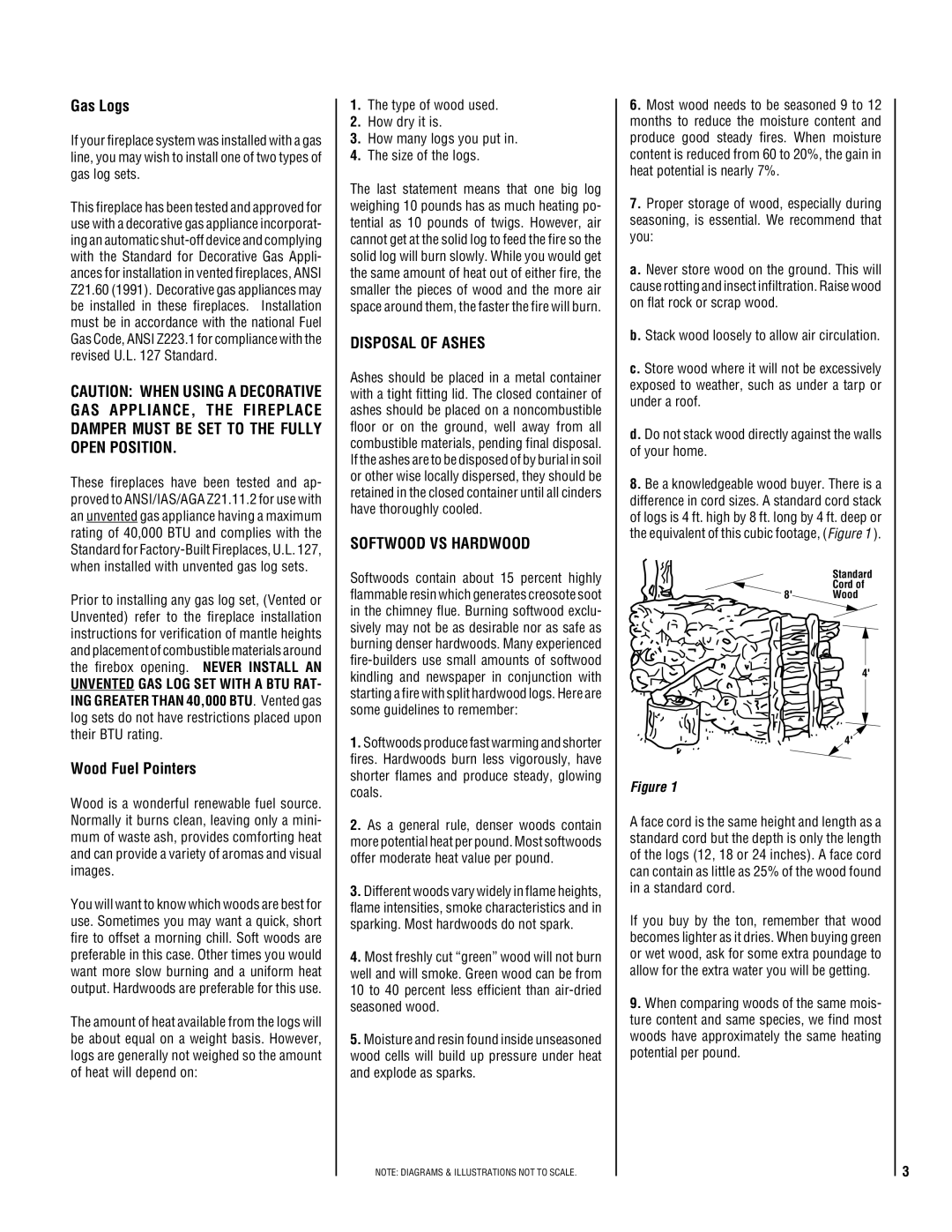Gas Logs
If your fireplace system was installed with a gas line, you may wish to install one of two types of gas log sets.
This fireplace has been tested and approved for use with a decorative gas appliance incorporat- ing an automatic shut-off device and complying with the Standard for Decorative Gas Appli- ances for installation in vented fireplaces, ANSI Z21.60 (1991). Decorative gas appliances may be installed in these fireplaces. Installation must be in accordance with the national Fuel Gas Code, ANSI Z223.1 for compliance with the revised U.L. 127 Standard.
CAUTION: WHEN USING A DECORATIVE GAS APPLIANCE, THE FIREPLACE DAMPER MUST BE SET TO THE FULLY OPEN POSITION.
These fireplaces have been tested and ap- proved to ANSI/IAS/AGA Z21.11.2 for use with an unvented gas appliance having a maximum rating of 40,000 BTU and complies with the Standard for Factory-Built Fireplaces, U.L. 127, when installed with unvented gas log sets.
Prior to installing any gas log set, (Vented or Unvented) refer to the fireplace installation instructions for verification of mantle heights and placement of combustible materials around the firebox opening. NEVER INSTALL AN
UNVENTED GAS LOG SET WITH A BTU RAT- ING GREATER THAN 40,000 BTU. Vented gas log sets do not have restrictions placed upon their BTU rating.
Wood Fuel Pointers
Wood is a wonderful renewable fuel source. Normally it burns clean, leaving only a mini- mum of waste ash, provides comforting heat and can provide a variety of aromas and visual images.
You will want to know which woods are best for use. Sometimes you may want a quick, short fire to offset a morning chill. Soft woods are preferable in this case. Other times you would want more slow burning and a uniform heat output. Hardwoods are preferable for this use.
The amount of heat available from the logs will be about equal on a weight basis. However, logs are generally not weighed so the amount of heat will depend on:
1.The type of wood used.
2.How dry it is.
3.How many logs you put in.
4.The size of the logs.
The last statement means that one big log weighing 10 pounds has as much heating po- tential as 10 pounds of twigs. However, air cannot get at the solid log to feed the fire so the solid log will burn slowly. While you would get the same amount of heat out of either fire, the smaller the pieces of wood and the more air space around them, the faster the fire will burn.
DISPOSAL OF ASHES
Ashes should be placed in a metal container with a tight fitting lid. The closed container of ashes should be placed on a noncombustible floor or on the ground, well away from all combustible materials, pending final disposal. If the ashes are to be disposed of by burial in soil or other wise locally dispersed, they should be retained in the closed container until all cinders have thoroughly cooled.
SOFTWOOD VS HARDWOOD
Softwoods contain about 15 percent highly flammable resin which generates creosote soot in the chimney flue. Burning softwood exclu- sively may not be as desirable nor as safe as burning denser hardwoods. Many experienced fire-builders use small amounts of softwood kindling and newspaper in conjunction with starting a fire with split hardwood logs. Here are some guidelines to remember:
1.Softwoods produce fast warming and shorter fires. Hardwoods burn less vigorously, have shorter flames and produce steady, glowing coals.
2.As a general rule, denser woods contain more potential heat per pound. Most softwoods offer moderate heat value per pound.
3.Different woods vary widely in flame heights, flame intensities, smoke characteristics and in sparking. Most hardwoods do not spark.
4.Most freshly cut “green” wood will not burn well and will smoke. Green wood can be from
10to 40 percent less efficient than air-dried seasoned wood.
5.Moisture and resin found inside unseasoned wood cells will build up pressure under heat and explode as sparks.
NOTE: DIAGRAMS & ILLUSTRATIONS NOT TO SCALE.
6.Most wood needs to be seasoned 9 to 12 months to reduce the moisture content and produce good steady fires. When moisture content is reduced from 60 to 20%, the gain in heat potential is nearly 7%.
7.Proper storage of wood, especially during seasoning, is essential. We recommend that you:
a. Never store wood on the ground. This will cause rotting and insect infiltration. Raise wood on flat rock or scrap wood.
b. Stack wood loosely to allow air circulation.
c. Store wood where it will not be excessively exposed to weather, such as under a tarp or under a roof.
d. Do not stack wood directly against the walls of your home.
8.Be a knowledgeable wood buyer. There is a difference in cord sizes. A standard cord stack of logs is 4 ft. high by 8 ft. long by 4 ft. deep or the equivalent of this cubic footage, (Figure 1 ).
4'
4'
Figure 1
A face cord is the same height and length as a standard cord but the depth is only the length of the logs (12, 18 or 24 inches). A face cord can contain as little as 25% of the wood found in a standard cord.
If you buy by the ton, remember that wood becomes lighter as it dries. When buying green or wet wood, ask for some extra poundage to allow for the extra water you will be getting.
9.When comparing woods of the same mois- ture content and same species, we find most woods have approximately the same heating potential per pound.
3

